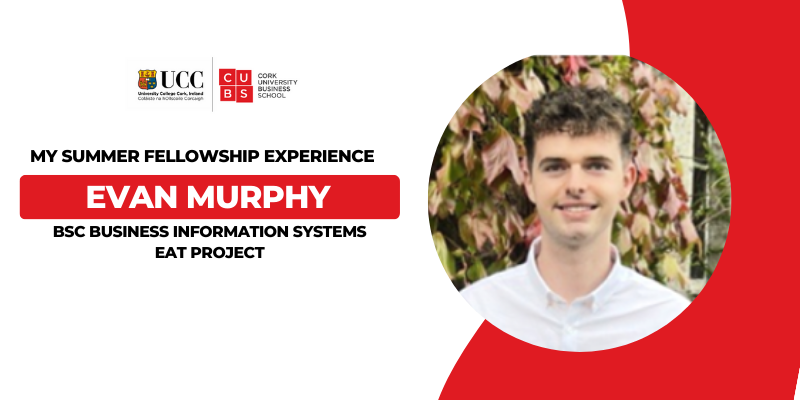
My name is Evan Murphy, and I’m currently a second-year student in the Business Information Systems program at UCC. When I heard about the opportunity to undertake a summer fellowship, I was eager to get involved. For me, this was a chance to gain valuable experience that could be applied in the real world while also contributing to a meaningful project that could enhance the BIS programme.
This summer, I had the privilege of working on a fellowship project focused on the EAT framework, specifically the first section, which is centred on assessment literacy. The EAT framework is an important tool in education, designed to improve the way assessments are designed and understood by both students and educators. My project involved collecting data through interviews with both students and lecturers to gain insights into how well students understand assignment requirements, feedback, and the expectations of their disciplines.
Before we could begin our research, we needed to obtain ethics approval, which was a completely new process for me. I wasn’t aware of the importance of this step prior to the fellowship, but I quickly learned that it’s crucial for ensuring that all research is conducted ethically and responsibly. The ethics review process required us to carefully consider how we would protect the privacy and confidentiality of our participants, ensuring that their involvement in the study was both voluntary and safeguarded. This experience gave me a deeper appreciation for the ethical standards that guide academic research and the responsibility that comes with conducting such studies.
My role in the project was multifaceted and engaging. My primary responsibilities included data analysis and interpretation, which involved coding the data we collected from the interviews. This process was both challenging and rewarding, as it required a deep understanding of the information we gathered and the ability to identify key themes and insights. Additionally, I was involved in recruiting participants for the study and conducting interviews. This was a new experience for me, and it allowed me to develop and hone my communication skills, particularly in an academic setting.
The key goal of our project was to assess how well students understand the assignments they’re given, the feedback they’re provided, and the overall expectations of their courses. By analysing the data, we hoped to identify any gaps in assessment literacy and find ways to improve the clarity and effectiveness of assignment instructions and feedback. This is crucial because understanding what is expected is a fundamental part of achieving academic success, and it’s something that can sometimes be overlooked in the rush of day-to-day coursework.
Working closely with a team of three lecturers from the Business Information Systems department was a unique and eye-opening experience. The team dynamic was fantastic, and I gained valuable insights into the work that lecturers do outside the lecture hall. It was interesting to see the amount of effort and thought that goes into designing assessments and supporting students in their academic journeys. This experience has given me a new appreciation for the work that goes into creating an effective learning environment.
One of the most significant takeaways from this fellowship has been the improvement in my data analysis skills. I’ve learned how to approach data systematically, how to code and interpret qualitative data, and how to draw meaningful conclusions from our findings. Additionally, I’ve developed new skills in communication, particularly in conducting interviews and engaging with participants in a way that encourages honest and insightful responses.
Looking ahead, I’m excited to apply these skills in the working world. The hands-on experience I’ve gained through this project has been invaluable, and I feel more prepared than ever to tackle challenges in my future career.
Overall, I would definitely recommend the fellowship program to all Business Information Systems students. It’s a fantastic opportunity to gain practical experience, work closely with faculty, and contribute to projects that have a real impact. I’m grateful for the experience and look forward to seeing how the findings from our project will be used to improve assessment literacy at UCC.
If you would liike to learn more about the BSc Business Information Systems at Cork University Business School (CUBS) at University College Cork (UCC), check out the full programme page here.

